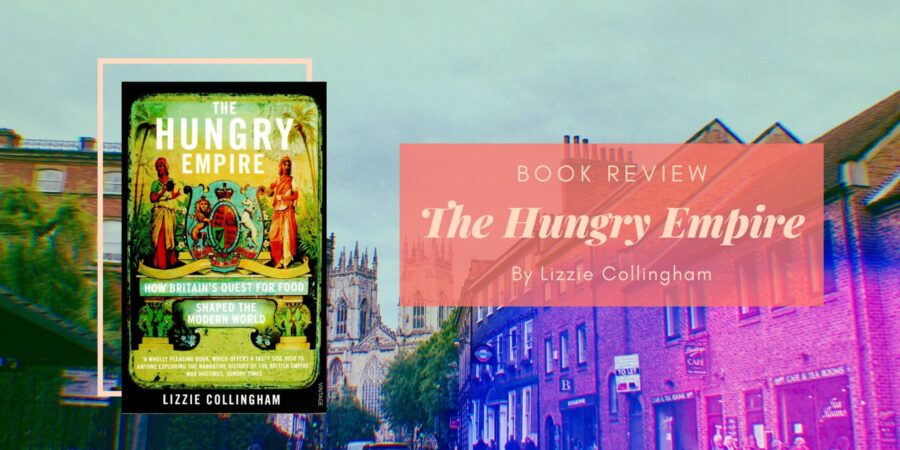Reading Afternoon Tea: A History reminded me that I had The Hungry Empire on my TBR list (found this book via Skye Soon’s review, if you want to have another, detailed opinion about it!). Very much like Afternon Tea, The Hungry Empire focuses on how the British Empire was influenced by, or influenced the food of its colonies. Unlike Afternoon Tea, however, The Hungry Empire is not restricted to one type of meal but looks at all sorts of food, from salted fish to sugar.
Each chapter of The Hungry Empire opens with a description of a meal. After that, Collingham goes into detail about where the meal was from and how Britain’s colonial actions influenced the meal, whether it was by changing ingredients according to their vision of what was “better” for their colonial subjects, or whether it was how the working class in Britain were changing their diet due to foods from various parts of the empire.
In general, I found that The Hungry Empire told the tale of something that still happens today: cheap imports may benefit the people of the country doing the importing, but it tends to exploit the people and resources of the exporting country. The formal structures of colonialism might not exist, but countries definitely still use trade in a similar manner. Wealth redistribution tends to happen between the working class of various nations rather than between the elite wealthy class and the lower classes.
As a tea lover, I was probably most interested in the sections about tea. One new thing I learnt was that tea was seen as a substitute for beer because of how sweet beer used to be. However, beer wasn’t as bad as the temperance movement painted it – it actually contained proteins and vitamin B, while the sugar in tea was largely empty calories. Hence, the switch to tea also came about as workers could no longer afford to brew their own beer, and signalled further impoverishment of the working class.
While I generally enjoyed the book and found it eye-opening, there were two things that gave me pause. The first is in Chapter 11, as Collingham describes a meal prepared by an Indian family in Patna, Bihar (a state in India). The last sentence of the description of the meal is: “The sauce they dipped it in was distinctively Indian, but they ate it in a similar fashion to the Africans, using their right hands to tear off a piece of chhattu, which they rolled into a neat ball and dipped into the chutney.”
While both the Indians and the Africans were subjugated by the British, I don’t like the idea that all subjugated people are similar, especially when I don’t see any influence in terms of eating habits. In a later chapter, we do see the influences of Indian people on other British subjects, but in this case, I’m not sure what the purpose of pointing out the similarities in how they eat is. This sentence was part of a larger paragraph on the similarities in the meal of the Indians and the African slaves, but while I see the link in terms of ingredients, I’m less certain of the influence of eating styles. Let’s not conflate the habits of all oppressed people, since this way of eating is distinctively Indian as well.
The other thing that gave me pause was, once again, the lack of discussion of the British colonies in Southeast and East Asia. Despite the huge impact of tea on the British empire, I saw no mention of Hong Kong. Neither were there chapters on Malaya (present-day Malaysia and Singapore), Myanmar (the chapters on the British Raj seem to be confined to India), Sri Lanka, Indonesia, or really anywhere else in Asia. I definitely have a personal stake in this, being from one of these overlooked former colonies, but I don’t understand why Collingham leaves out one section of the British Empire. That said, it’s important that we study the impact on Africa, the Americas, West Indies, and India, so I wouldn’t suggest replacing any chapters – I would have preferred for more to be included.
And also, I’m just confused on how I can read two books about the impact of the British empire on food that leave out the same region.
Overall, though, I found this to be a valuable work for those who are studying the British Empire and its impact. I actually find it to be a bit more useful than Afternoon Tea, since its focus is wider and it also looks at how the colonies affected Britain. Still, both books are useful and can complement one another, so depending on what interests you, you may want to read both books.
